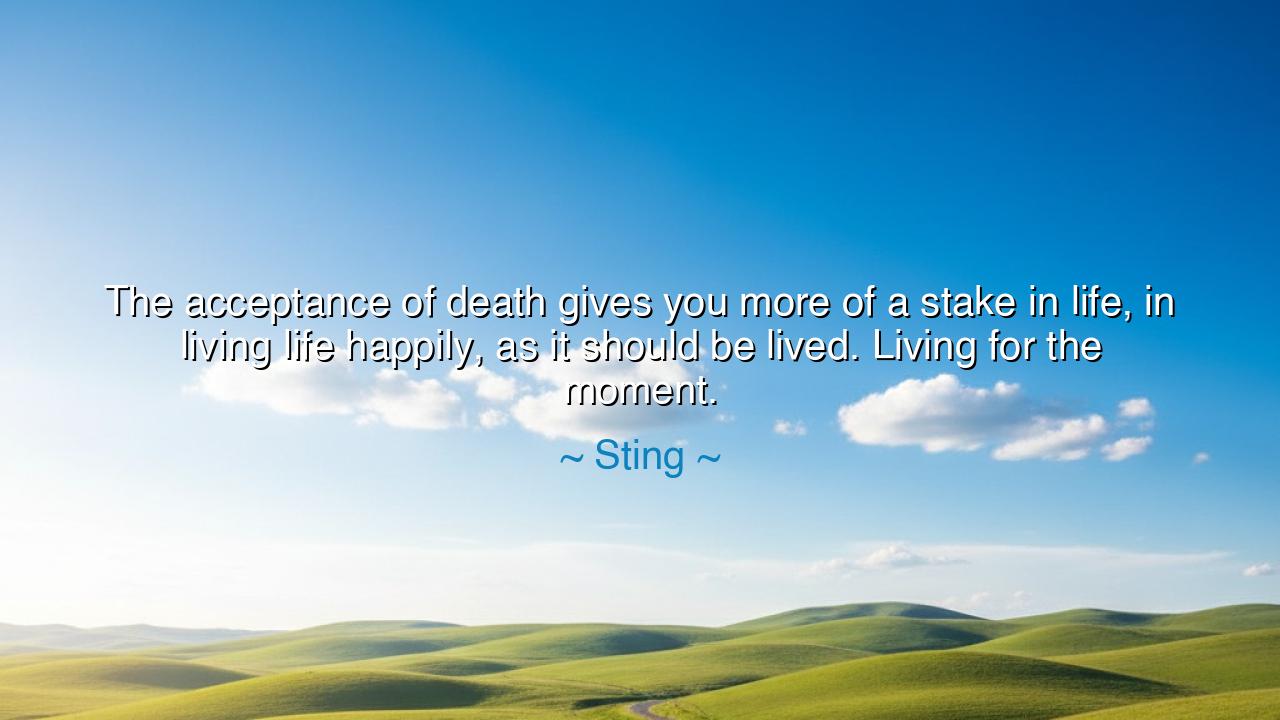
The acceptance of death gives you more of a stake in life, in
The acceptance of death gives you more of a stake in life, in living life happily, as it should be lived. Living for the moment.






The words of Sting — “The acceptance of death gives you more of a stake in life, in living life happily, as it should be lived. Living for the moment.” — are a meditation on mortality, and on the strange paradox that to truly live, one must first make peace with dying. These words come not from despair, but from enlightenment — from the understanding that life’s beauty shines more brightly when it is recognized as temporary. In them, we hear the echo of ancient wisdom, the same truth spoken by philosophers and mystics through the ages: that awareness of death is not the enemy of joy, but its foundation. For the man who fears death is enslaved by time, but the one who accepts it is freed to embrace every passing moment as sacred.
Sting, the poet and musician, has long woven spiritual reflection into his art. His words were born from contemplation — from observing how people strive endlessly for permanence, wealth, or glory, only to find emptiness in their abundance. He realized, as the sages of old did, that mortality gives life its weight. When one denies death, one denies the preciousness of each breath. But when one accepts it — not as tragedy, but as truth — the veil of illusion falls away. What remains is clarity: that the only moment we truly possess is the one we are living now.
The ancients called this awareness memento mori — the remembrance of death. The Stoics of Greece and Rome, like Marcus Aurelius and Seneca, carried this thought not as a source of gloom but as a guide to peace. “You could leave life right now,” Aurelius wrote. “Let that determine what you do and say and think.” In this same spirit, Sting reminds us that to live well is to live consciously, aware that time is fleeting. For when we understand that the hourglass is running, we no longer waste time on anger, envy, or regret. We stop living for some distant future and begin to live — fully, gratefully, in the present moment.
Consider the story of Siddhartha Gautama, the Buddha, who as a young prince lived in luxury, shielded from suffering. But one day he encountered an old man, a sick man, and a corpse — and the revelation of mortality struck him like thunder. It was that moment, the acceptance of death, that awakened in him the desire to understand life. He left his palace, seeking truth, and in time discovered enlightenment — the peace that comes when one no longer clings to what must pass. So too, Sting’s words call us to awakening: to face death not as a shadow to flee from, but as a teacher that reveals what truly matters.
To “live happily” in the face of mortality is not to seek pleasure alone, but to live with intention. It means to love more deeply, to forgive more quickly, to speak more truthfully, to waste less time on trivialities. The man who accepts death knows that every sunrise is a gift, that every shared meal, every smile, every breath is a miracle. He ceases to postpone joy until some imagined future; he knows that life happens only now. The wisdom of this truth transforms existence from a series of duties into an unfolding wonder.
And yet, this acceptance does not mean surrender to fate. Rather, it is the foundation of courage. When a warrior accepts death before battle, he fights without fear. When a creator accepts mortality, he dares to make art that outlives him. When an ordinary soul accepts the impermanence of all things, he is free to love without chains, knowing that love itself transcends time. To accept death is to stand unafraid before the unknown and to say: “Because I will one day die, I will live more fiercely, more beautifully, more truthfully today.”
So, my children, let this be the lesson of Sting’s words: do not waste your days fleeing the shadow of death, for it walks beside you whether you acknowledge it or not. Instead, take its hand as a friend, and let it remind you how precious your days are. Rise each morning as though it were your first; rest each night as though it might be your last. Let gratitude be your song and kindness your legacy. In accepting that all things end, you will discover what the ancients called the art of living — the ability to dwell fully in each fleeting moment, not with fear, but with joy. For to live “for the moment” is not to live carelessly, but to live awake — aware that the river of time carries all things away, yet rejoicing in the sparkle of the water as it passes beneath the sun.






AAdministratorAdministrator
Welcome, honored guests. Please leave a comment, we will respond soon